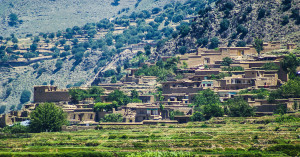Formed in 1978 and granted status in 2002 as a fully incorporated United Nations agency, the United Nations Human Settlements Program (UN-Habitat) has for nearly four decades undertaken efforts to confront the issues of ongoing urban growth worldwide. UN-Habitat addresses urbanization through a holistic and global approach.

Image courtesy Ricardo Manguel | Flickr
The agency promotes the development of cities that provide environmentally sustainable and future-proof infrastructure, sufficient shelter for all residents, and inclusive social and economic opportunities. Together with its work in historical areas of focus like city planning and structural enhancement, UN-Habitat assists countries, cities, towns, and villages with the technical aspects of such matters as governance, risk preparedness, poverty alleviation, and water resource management.
Engaged in more than 70 countries, UN-Habitat maintains activities in Afghanistan through its Fukuoka, Japan-based Regional Office for Asia and the Pacific (ROAP). The UN-Habitat ROAP facilitates financial assistance and project development that helps 58 countries spanning from Iran to the Pacific Islands contend with the human settlements challenges posed by rapid concentration of human populations, conflict, and natural disasters. All of UN-Habitat’s projects in the Asia-Pacific region emphasize empowerment of the impacted communities and participation of residents in local development.
Aiding Urban and Rural Development in Afghanistan
Since first bringing its community-based approach to Afghanistan in 1992, UN-Habitat has supported viable, cost-effective development in rural and urban areas. It accomplishes this by partnering with local residents to plan and carry out projects that the community itself has determined to be of primary importance.
UN-Habitat bolsters its partnerships with Afghan communities by working in collaboration with an array of entities. These entities range from the Government of Afghanistan and municipal authorities, to non-governmental organizations and other UN agencies.
Over the years, UN-Habitat has contributed resources in Afghanistan to support building restoration, social rehabilitation, and the provision of essential services such as housing, drinking water, and skills training. The agency has also assisted the Afghan government in various efforts to increase its institutional capacity and ability to direct the transition of the country through a challenging period of national reconciliation.
For the interval beginning in 2008 and ending in 2016, UN-Habitat has committed over $291 million in funding for projects in Afghanistan. UN-Habitat operates in 10 Afghan provinces, and its activities in Afghanistan since 2002 have encompassed a variety of diverse initiatives to help enable the people of Afghanistan to efficiently and justly manage human settlement growth in their country.
UN-Habitat’s Role in Implementing the National Solidarity Program
As a Facilitating Partner of the Government of Afghanistan’s National Solidarity Program (NSP), UN-Habitat has helped establish self-governing institutions for rural populations by supporting Community Development Councils (CDCs) in 3,258 communities in 9 provinces. Under the NSP, community members identify areas of collective need and democratically elect their CDC representatives by secret ballot.

Image courtesy Hadi Zaher | Flickr
The CDCs then prepare Community Development Plans that constitute the overall designs and proposals for such sub-projects as school and medical facility construction, irrigation equipment installation, and road building. UN-Habitat aids CDCs with the formation of these plans and provides technical assistance for the implementation, evaluation, and monitoring of each sub-project.
By 2009, just under 4 million people had participated in the NSP, leading to the completion of 7,250 community-managed infrastructure and human capacity building sub-projects. The targeted communities cumulatively received $144 million to finance the authorized sub-projects.
To further enhance the capabilities of communities to direct their own development, UN-Habitat facilitated several skills training programs. The agency also produced instructional guides on such topics as engineering practices, transition from conflict, and the five stages of social mobilization outlined by the NSP.
Supporting Urban Reintegration and Rural Livelihoods
Also through the NSP, UN-Habitat has initiated Peace-Building in Afghanistan through Consolidation of Community Solidarity (PACCS). This multifaceted project is funded by the Government of Japan.
The primary component of PACCS targets the need to assimilate and secure the rights of demobilized combatants, internally displaced persons (IDPs), and returned refugees living in Afghanistan’s urban centers. Aid delivered by the program to CDCs and local government institutions in 42 communities provides public facilities and basic services for 73,500 individuals from these underserved populations.
Other elements of PACCS seek to unify Afghans in rural regions by helping them work together to improve their own well-being. In 180 rural communities, PACCS aims to engage 45,000 families in CDC infrastructure projects to upgrade roads, health care facilities, school buildings, and other public structures.
The program also establishes community banks that will allow CDCs in 1,400 rural communities to supply loans that will aid 21,000 people in their pursuit of better livelihood opportunities. Furthermore, PACCS will provide 350,000 families in these communities with occupational training and assistance with starting income-generating businesses.
Involving Young Afghans in Community Development
With the objective of involving greater numbers of young Afghans in national restoration efforts and the promotion of peace and democracy, UN-Habitat established the Youth Empowerment Project (YEP). The project has built a network of 120 Youth Councils in six provinces and delivered community service and leadership training to 2,600 individuals between the ages of 14 and 25 in 60 urban and rural communities.
The participants receive instruction in how to participate in their CDCs, and they play an active role in planning the development of their communities. Additionally, program recipients take part in the promotion of the academic, economic, cultural, and athletic spheres of civil society.
Since UN-Habitat introduced YEP, the project has proven an effective vehicle for increasing volunteerism among young Afghans, and the Youth Councils have garnered the support of their home communities. As early as 2009, the Youth Councils had conducted successful fundraising campaigns and collectively planned, overseen, and executed over 150 self-initiated civic projects.

